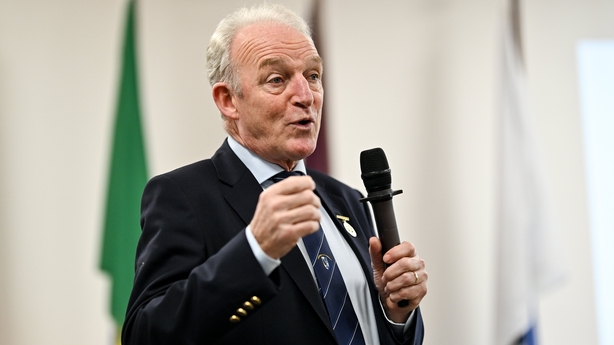The Steering Group on Integration (SGI) of the GAA, the Camogie Association and the Ladies Gaelic Football Association will meet next week to launch their vision for unifying the three organisations.
The SGI features three association presidents in the GAA's Larry McCarthy, the Camogie Association's Hilda Breslin and Mícheál Naughton of the LGFA.
It also includes the three directors general - the GAA’s Tom Ryan, Sinéad McNulty from the Camogie Association and the LGFA’s Helen O'Rourke.
Former Irish president Mary McAleese is chair of the SGI, which is project-managed by Mark Dorman, the head of organisational change at the GAA.
The SGI spent much of last year working on research and member engagement, which included the largest membership response to a sports survey in Ireland, with initial findings from the more than 30,000 participants showing that nine out of 10 members "believe integration will be positive for Gaelic games" and seven in 10 believing it will be "very positive".
At the time, McAleese said that feedback sent "a very clear message" on integration between the three Gaelic games bodies.
In addition, there were meetings and consultations with members operating on the 'One Club' model’.
The SGI issued a deadline of February 2024 for the publication of its integration roadmap and that will now be launched next Tuesday morning at Croke Park.
In the past year, a number of observations and concerns about the logistics, length and complexity of the integration process have been raised.
In his annual report to Connacht GAA's convention before Christmas, provincial secretary John Prenty highlighted the massive spend on inter-county teams, while he also warned that when the process to have a fully integrated Gaelic sports association is completed, costs for preparing teams could double.
"All of this, at a time before the GAA is fully integrated with the LGFA and Camogie Association, which will at least double the costs of preparing inter-county teams without taking into account the infrastructural requirements which will come with being one association," he wrote.
"In the past I have suggested that it may be time that a fair play financial ceiling is put in place on how much should be spent on inter-county teams. Maybe now is the time to act before things go out of control."

At the same convention, outgoing Connacht president John Murphy (pictured) said that while the integration process was a positive one, significant State funding would be needed to make it become a reality.
"While integration is a positive move for the association, I believe it will take years to implement. The committee are now discovering that it is a mammoth task," he said.
"To develop the association with the means to accommodate all genders will require a massive investment in facilities.
Currently we are not in a position to develop facilities as they will be required/demanded, therefore it will require a huge financial contribution from the Government to bring it about.
"It is not possible to change a culture or facilities built for a male-dominated game overnight and people have to understand that."
As far back as October 2022, the Gaelic Players Association expressed its concern with the slow pace of the integration process.
For those at the coalface of making the unification work, they are no doubt looking closely at a template already in place - the 'One Club' model works well at ground level and clubs are signing up for it at a healthy rate.
This model centres on the overall governance of a GAA club.
Each club participant, including participants in ladies football and camogie, is registered as a member of the GAA and the day-to-day running of each code is managed by its own committee.
Ladies football and camogie are affiliated as clubs with their respective national associations and appoint officers as required by their respective governing constitutions and register as members of their respective associations.
But in addition, the overall club chair, secretary and treasurer register as members of the ladies football and camogie associations.
Club membership fee is not varied by reference to code played and the club executive has overall responsibility for running of the club, with each of the playing codes being adequately represented on that executive.
Bank accounts are controlled at club executive level and not by code and a co-ordinated approach is taken to fundraising, with a shared approach to games promotion and coaching adopted, with a fair allocation of playing facilities made across all codes.
That is the model that clubs are adapting and progress at inter-county level should be similar.
Key to next Tuesday's announcement, however, will be how the SGI proposes to deal with the obvious obstacles that are looming – like funding and financing, allocating facilities, and ensuring there are no dual code clashes with fixtures – as has been seen too often in camogie and ladies football in recent seasons.
Watch Kerry v Mayo in the Allianz Football League on Saturday from 7.20pm on RTÉ2 and RTÉ Player, follow a live blog on rte.ie/sport and the RTÉ News app and listen to updates on Saturday Sport on RTÉ Radio 1
Watch highlights on Allianz League Sunday on RTÉ2 and RTÉ Player from 9.30pm, follow a live blog every Sunday afternoon on rte.ie/sport and the RTÉ News app and listen to live updates on Sunday Sport


